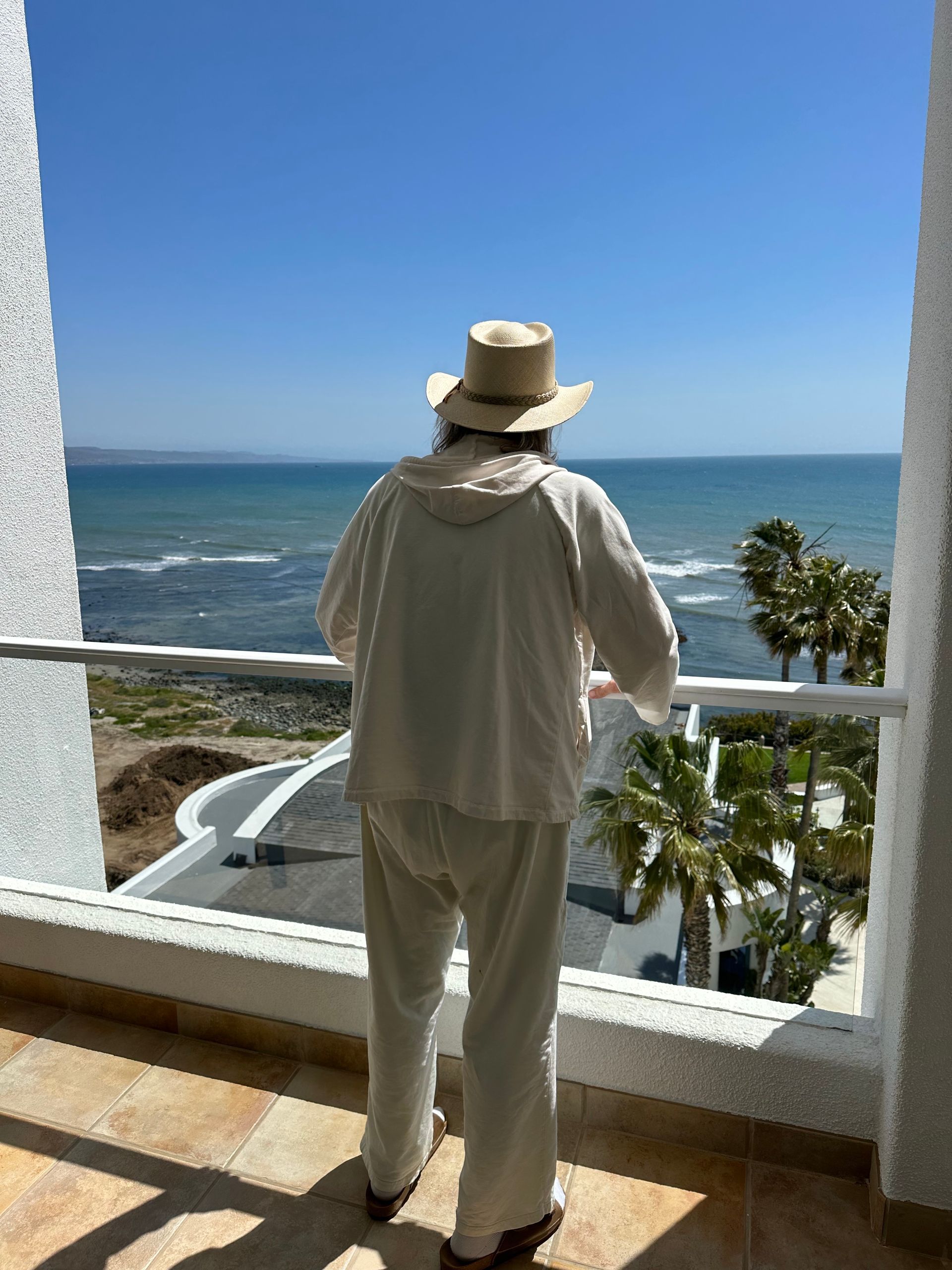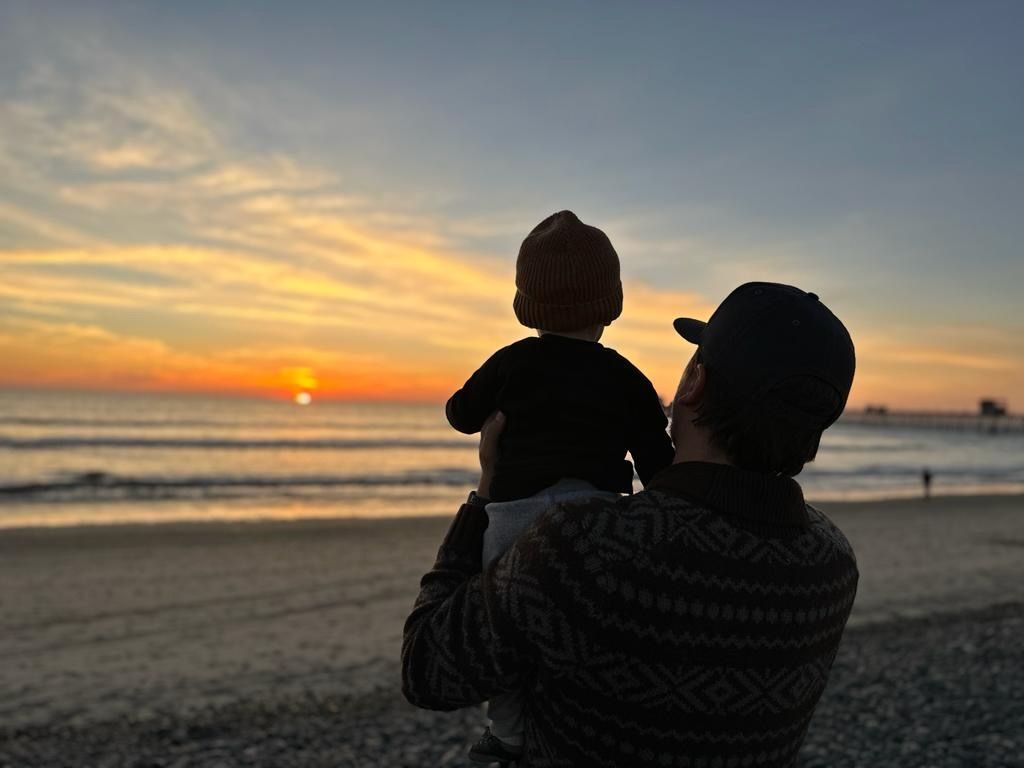Concentric Circles of Priority and Influence
How putting first things first enables a greater and more sustained impact.
Here’s a recurring concept that has shown up on my life. I’ll call it the “concentric circles.” I’m sure I picked it up in some leadership book, but I can’t for the life of me remember which one, or maybe it’s just a concept that merges other concepts. Anyway, it can be used to picture a lot of things, but most relate in some form to sphere’s of influence or spheres of priority.
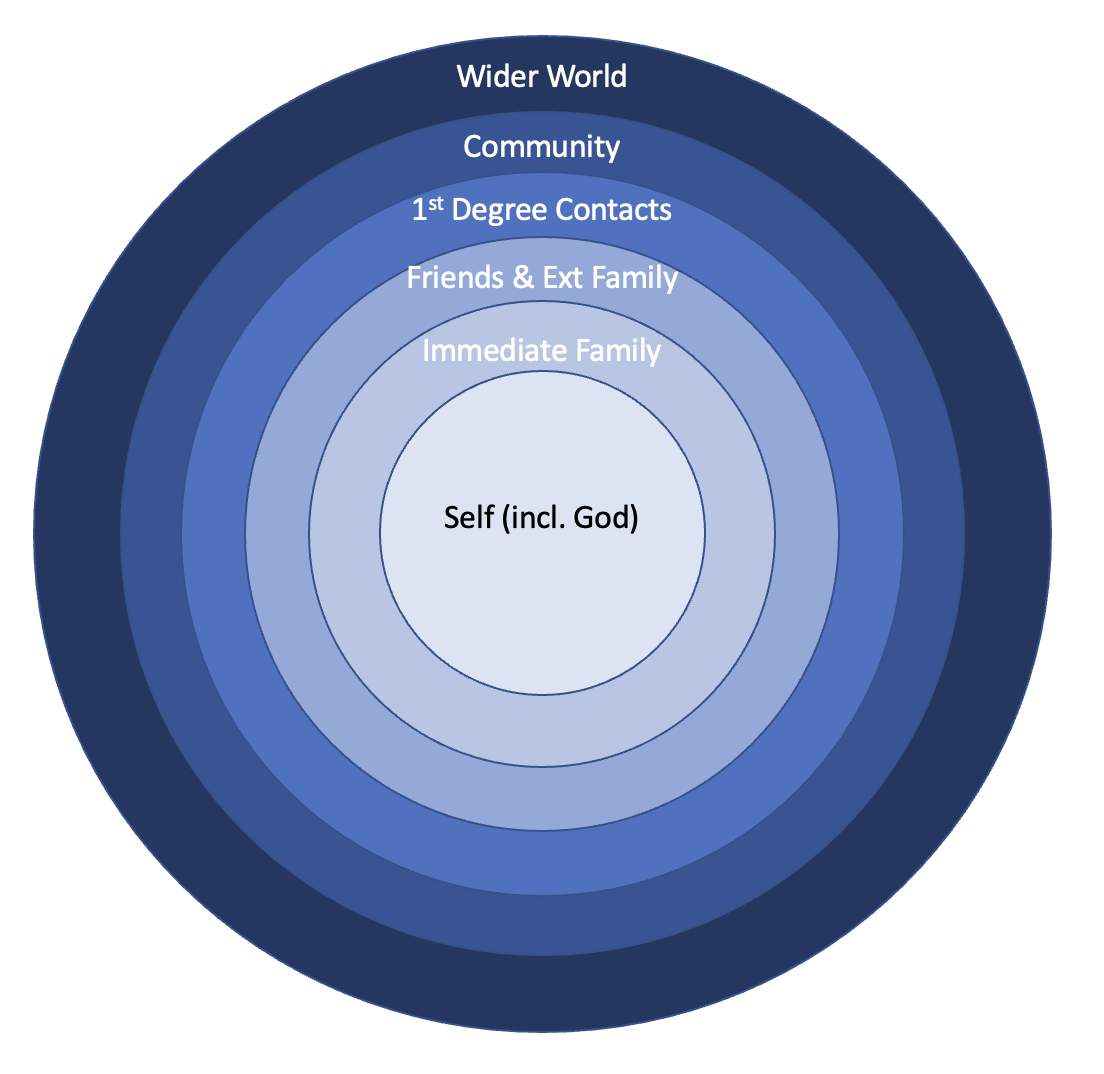
Priority
First, let’s look at priorities. Something I have learned about myself is that I have long said my priorities start from the center of the circles and spread outward. However, if I were to do a time analysis on my schedule anytime before December of 2021, one would see that my time was disproportionately spent on the wider circles - 1st Degree Contacts (e.g., coworkers, customers, etc.) and Community. My heart said that family comes first, but my actions spoke otherwise. In fact, in order to work on the outer circles, I asked a lot
- of myself: sacrificing exercise, sleep, hobbies
- of my immediate family: “Sorry, I have to work that night/weekend. I have to be on the road,” etc.
- of my Friends and extended family: missing special events or get-togethers, or being absent minded when together.
One could then assume that either my priorities were my work and community commitments over my family, or I was not aligned with my heart when allocating time. In my case, it was the latter, and every time I asked self/family/friends to “forgive me but…” it took an emotional toll on me, and that depleted my emotional bank account over time. I also spent a lot of money and resources on “making up for” my misaligned priorities. I’d fly my wife with me to the work destinations across the globe. We’d go out to eat a lot more because after a 14 hour work day I just wanted to go out. I spent more on things, wanting to buy nice things for those I loved (and probably making up for the lack of time we had together.) Sure, I wanted to do those things anyway; I just think I needed to do them more when filling the void of time.
Naturally, the answer is to reprioritize, in combination with setting boundaries. It’s like the exercise of filling a jar with large rocks, small pebbles, and sand. One has to fill the jar in the appropriate order - the large rocks first (top priorities), then the smaller rocks (important things that need to get done), and then the sand (little things, many that don’t ‘need’ to get done).
The two key things to me were 1) getting serious about putting first things first, and 2) being realistic about how much time each of the circles demanded of me, given the commitments I had made. For instance, when thinking about point 2, there are many factors in work that deem how much time it requires. Industry, role, objectives, timelines to achieve the goals, risks/threats, team, and so on. If you want to be the best, AND grow the business the fastest, AND grow to be the biggest, AND help team members grow, AND reach the milestones before your competitors, it takes dedication and a lot of time. I’ve known too many people with hearts for their family/friends, who want to be healthy, and who want to be involved in their community, but who say repeatedly “I don’t have time,” or “when I achieve X, then I’ll make time.” I was one of those people. Then, God willing, you a) live long enough to get to that inflection point and b) recognize the time when you get there.
The funny thing is that I sincerely believe putting priorities in order of the circles makes one better at all of it - boss, employee, spouse, parent, etc. I believe companies benefit when people are more balanced (often despite the company culture). I believe people do more inspiring work. I just think we don’t prioritize actually putting the inner circles first, and imagining what it looks like in the workplace or community when we encourage that kind of prioritization. I know I used to encourage others to prioritize, but I don’t think I was the best example. As Tim McGraw’s song goes… “I’m better than I used to be.”
Influence
That leads us to the other way of looking at the concentric circles - as spheres of influence. Assume you are someone who wants to change your community, or change the world. What does that look like if you focus all of your time and energy on the outer circles but don’t take the time to shore up the inner ones? How many people do you know who work nonstop and appear to be very successful, but suffer from one or more of alcoholism or substance abuse, broken relationships, insomnia, mysterious health conditions (e.g., brain fog, heart palpitations, or worse…), or never have time to attend events with their kids/friends/etc?
How many of those people do you admire? If you were to wish something for your child, how much of that lifestyle would you wish for them?
Another analogy that I think goes well with the circles is one of a mountain. Image the mountain is “holding space” where other things can thrive. The bigger the mountain, the more climates it influences, the more it helps bring water and shelter, beautiful views, etc. If we were to say each of the concentric circles is a cone, and you’re looking down (from above) on the cones when you see circles; and if each circle is as high as one is aligned to one’s priorities, then a well-aligned person’s circles would look like a mountain.
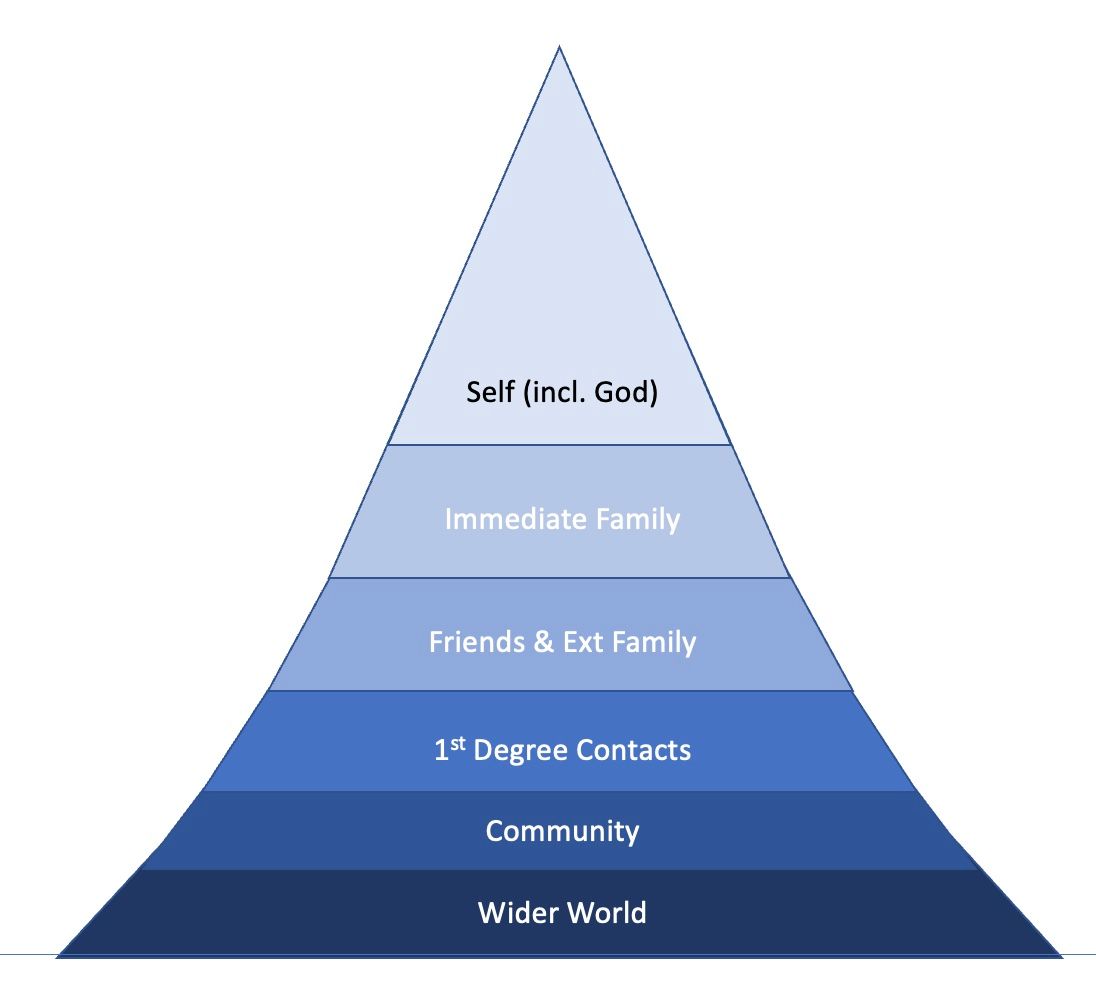
But what about someone who is focusing on the wider world, but not focusing on the inner circles? Those circles would be crevices, rather than mountains. Such an example might look more like the following - as if there’s a hole in the middle, like a volcano that blew its top. Rather than holding space, it’s as if there’s a vacuum, or a hole that constantly needs filling
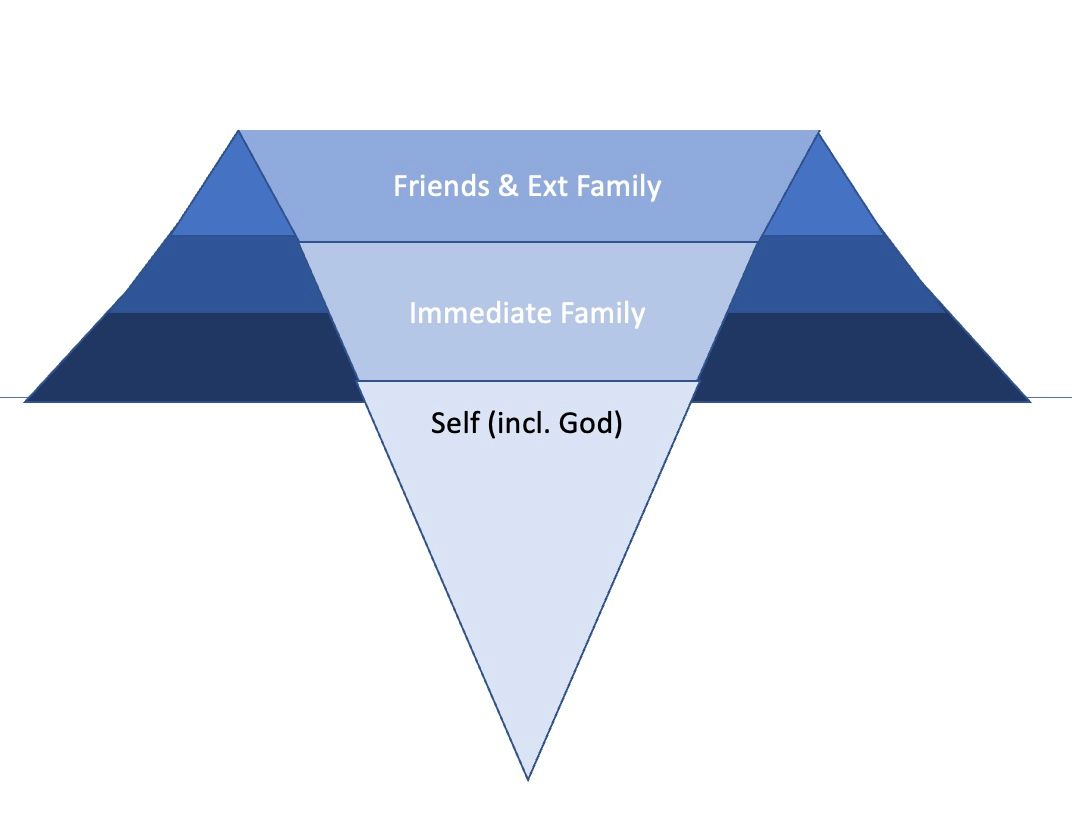
As a final analogy, tree trunks have rings (like concentric circles) as they grow and add outside layers each year. Life and sustenance traverse the trunk via outer rings, while the inner rings provide strength. Trees that experience rot from pests, fungus, etc. coming from the outside, which then cause decay of the wood at the center of the tree trunk or branches. That decay or softening of the heartwood makes the tree or branch structurally weaker, which may lead to branches or the tree itself to break. Let’s say you are the tree. You want to grow tall, reach wide, provide shade, be deeply rooted, etc. That is only possible with a strong core.
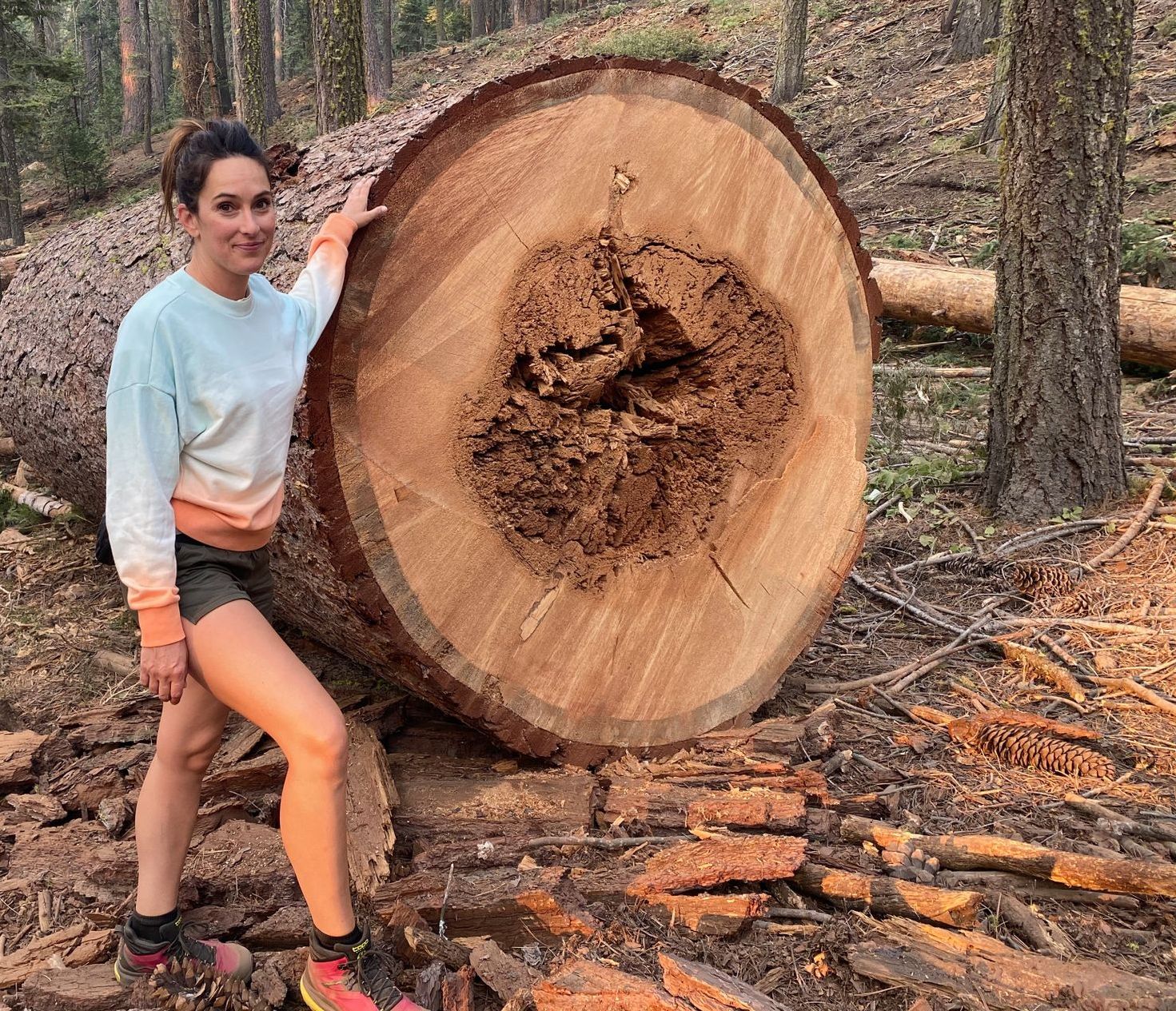
However you prefer to look at the circles, I hope the analogy is useful for you.
Some questions to ponder:
- Do these concepts resonate in your life or your experience?
- How do your circles look now?
- Are there spheres you want to influence but “don’t have time” to now?
- What changes might you make to your priorities or boundaries that would impact your circles?
On a side note, you may be asking why I put “including God” in the middle circle. To me, that’s where it goes because it’s a personal thing one decides for oneself. The way in which that decision is made and one responds to that decision influences that person. That person chooses how to have it influence other circles.


